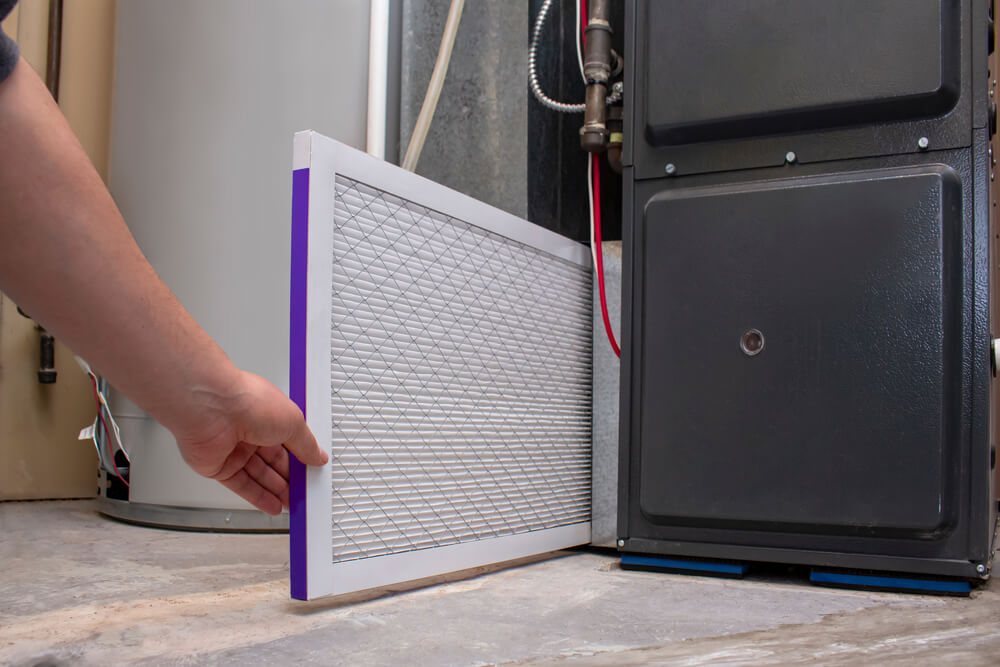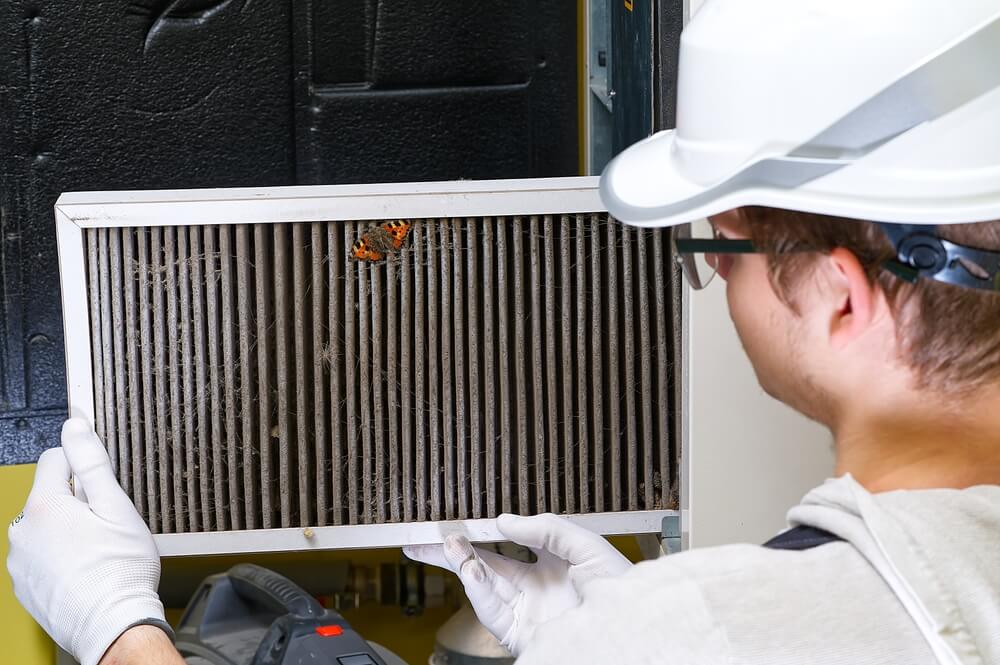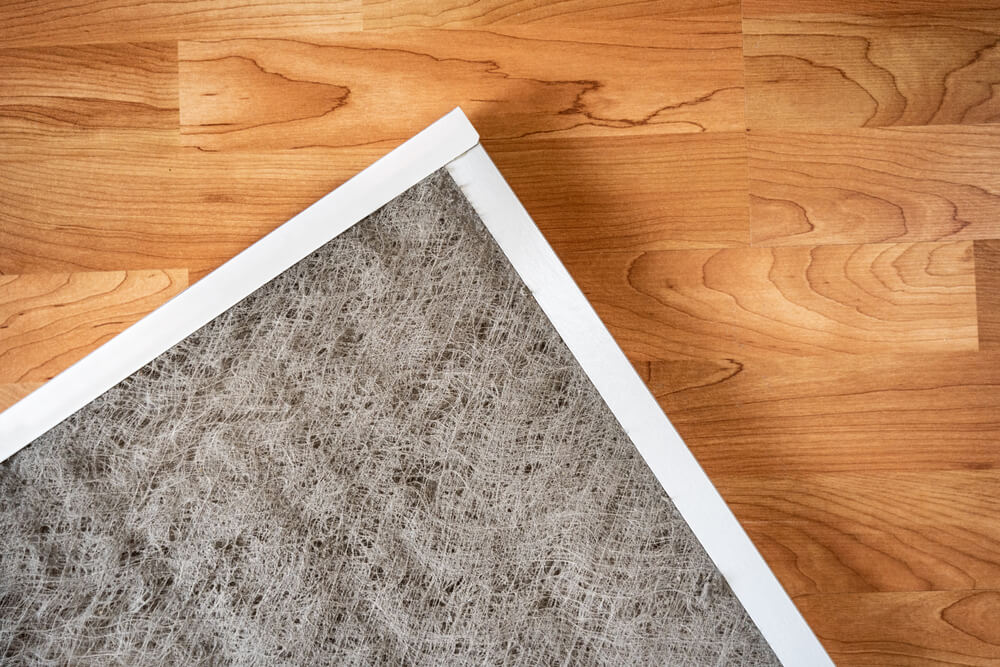Blog
Why Do You Need to Change Your Furnace Filter?
As winter approaches, ensuring your home’s heating system runs efficiently becomes a top priority. One simple yet often overlooked maintenance task that plays a significant role in the performance of your HVAC system is changing the furnace filter. At One Stop HVAC, we understand the importance of regular furnace filter replacement and how it can enhance your home’s comfort, improve indoor air quality, and extend the life of your HVAC unit.
How Often Should You Change Your Furnace Filter?
The frequency of changing your furnace filter depends on various factors, such as the type of filter you use, the size of your home, the number of occupants, and your indoor air quality. As a general guideline, it is recommended to inspect your furnace filter every 30 days and replace it every 30 – 90 days, depending on its condition. A clogged or visibly dirty filter should be replaced immediately to maintain optimal performance.
Factors Affecting Replacement Frequency
Filter Type and Efficiency
The type and efficiency of the furnace filter directly impact how often it needs to be replaced. Filters come in various thicknesses, ranging from 1-inch to 6-inch, and different materials. Thicker filters with higher MERV ratings are more effective at trapping airborne contaminants, such as dust, pollen, pet dander, mould spores, and bacteria. Filters with higher MERV ratings have a finer mesh that can capture smaller particles, making them ideal for homes with allergy sufferers or those seeking superior air quality. However, these high-efficiency filters may also require more frequent replacement compared to standard filters.
Home Occupancy and Lifestyle
The number of occupants in your home and their daily activities play a significant role in the rate at which pollutants accumulate in the filter. A larger household with more residents means more dust, pet hair, and other particles are introduced into the indoor air. Homes with children or active individuals may generate additional contaminants, such as dirt from outdoor activities. Additionally, frequent visitors or hosting gatherings can contribute to higher pollutant levels, necessitating more frequent filter replacements.
Pets and Pet Hair
Furry family members bring joy, but they also bring extra dust and pet dander into the air. Shedding pets can significantly impact the air quality, leading to faster clogging of the furnace filter. Pet owners should be vigilant about changing their filters more frequently to keep the indoor air clean and fresh.
Indoor Air Quality Equipment
Homes equipped with additional indoor air quality equipment, such as air purifiers, air cleaners, or whole-house ventilation systems, can reduce the workload on the furnace filter. These systems actively remove particles and pollutants from the air, helping to prevent rapid filter clogging. If your home has advanced indoor air quality solutions, you may not need to change the filter as often, but regular maintenance and filter checks are still essential.
Allergies and Respiratory Conditions
Individuals with allergies or respiratory issues are more sensitive to indoor air pollutants. To ensure a healthy living environment, it is crucial to change the furnace filter regularly, even if the recommended replacement frequency is longer. A clean filter can help reduce common allergens and irritants, providing relief and comfort to those affected by respiratory conditions.

Reasons Why It Is Important to Change the Furnace Filter
Improved Air Quality
Indoor air quality plays a crucial role in maintaining a healthy living environment for you and your family. A clean furnace filter acts as the first line of defence against airborne pollutants, such as dust, pollen, mould spores, and pet dander. As air circulates through the filter, these contaminants are trapped, preventing them from recirculating throughout your home. This filtration process helps reduce allergy and asthma symptoms, promoting respiratory health and enhancing overall well-being.
Enhanced System Efficiency
Efficiency is the key to maximizing the performance of your HVAC system while minimizing energy consumption. When your furnace filter becomes clogged with debris and dirt, it obstructs the smooth flow of air. As a result, your heating system must work harder to maintain the desired temperature, leading to increased energy usage and higher utility bills. By regularly changing the furnace filter, you ensure proper airflow, allowing the system to operate at its peak efficiency and keeping your energy costs in check.
Extended System Lifespan
Your HVAC system represents a significant investment in your home’s comfort, and you want it to last for many years to come. A clean furnace filter is instrumental in preserving the health of your heating system. When debris and dust accumulate on sensitive components like the blower motor and heat exchanger, it can lead to unnecessary wear and tear. Over time, this can result in avoidable breakdowns and the need for costly repairs. By diligently replacing the filter, you protect your HVAC system from undue strain and extend its lifespan, ultimately saving you money on premature replacements.
Cost Savings
Regular furnace filter replacements contribute to long-term cost savings in several ways. Firstly, a clean filter ensures that your HVAC system operates efficiently, reducing energy consumption and lowering your monthly utility bills. Secondly, by preventing excessive wear on critical components, you minimize the risk of major system malfunctions and costly repairs. Lastly, routine filter changes promote optimal system performance, which may lead to a longer overall lifespan for your heating system, saving you from the expense of an early replacement.
Preventing Short-Cycling and Overheating
A clogged furnace filter can lead to short-cycling, a situation where the HVAC system frequently turns on and off in rapid succession. Short cycling not only wastes energy but also places unnecessary stress on the equipment. Moreover, a blocked filter can impede proper airflow, causing the system to overheat. Overheating poses a serious risk of damage to crucial components, leading to breakdowns and potentially unsafe operating conditions. Regularly changing the filter prevents these issues, ensuring your heating system operates smoothly and safely.
Maintaining a Cleaner Home
A clean furnace filter not only benefits your HVAC system but also contributes to a cleaner living space. As the filter efficiently traps dust and particles, less airborne debris circulates throughout your home. Consequently, there is less settling of dust on furniture, floors, and other surfaces, reducing the need for frequent cleaning and providing you with a tidier and more comfortable home environment.

Changing your furnace filter regularly is a simple yet essential maintenance task that yields numerous benefits. From improved indoor air quality and enhanced system efficiency to prolonged HVAC system lifespan and cost savings, the advantages of routine filter replacement are undeniable. At One Stop HVAC, we encourage you to prioritize this small but impactful measure in caring for your heating system, ensuring optimal performance, comfort, and peace of mind throughout the colder months. By making furnace filter changes a regular part of your HVAC maintenance routine, you invest in the long-term health of your heating system and the well-being of your family.
Stay proactive and enjoy the benefits of a cleaner, more efficient, and healthier home. If you need any assistance replacing or cleaning your furnace filter, please don’t hesitate to call our team at One Stop HVAC!
